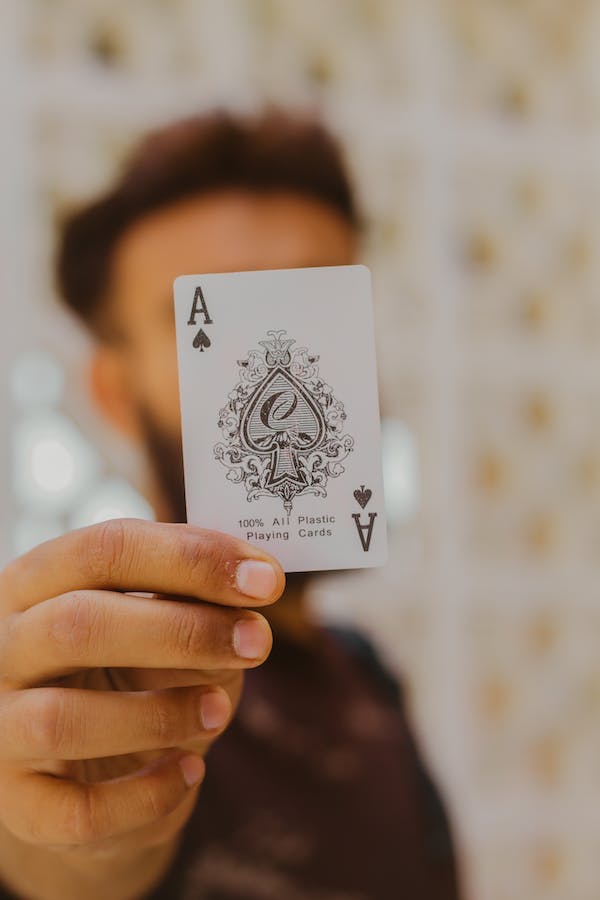Poker is not just a game of cards; it is a game of psychology. Understanding the psychology behind poker can give players a significant advantage at the table. By mastering the art of reading opponents, bluffing effectively, and adopting a winning mindset, players can unleash the power of poker psychology and greatly improve their chances of success. In this article, we will explore the importance of poker psychology and how it can be harnessed to gain an edge in the game.
The Importance of Reading Opponents in Poker Psychology
Reading opponents in poker psychology is not about mind-reading or supernatural abilities. It is about observing and analyzing the subtle cues and signals that players unknowingly give off during a game. These cues can provide valuable insights into their thought processes, intentions, and the strength of their hand.
One of the most common cues that players give off is their body language. A player who is confident and relaxed may have a strong hand, while a player who is fidgeting or avoiding eye contact may be bluffing. By paying close attention to these non-verbal cues, skilled players can gain a significant advantage in the game.
Another important aspect of reading opponents in poker psychology is understanding their betting patterns. How much a player bets, when they bet, and how they react to other players’ bets can reveal a lot about their hand. For example, a player who consistently bets aggressively may have a strong hand, while a player who hesitates or checks may be unsure of their cards.
In addition to body language and betting patterns, verbal cues can also provide valuable information about an opponent’s hand. Paying attention to the words and tone used by other players can help you gauge their confidence level and assess the strength of their hand. For example, a player who confidently declares, “I have the nuts,” may indeed have a winning hand, while a player who hesitates or stutters may be bluffing.
However, it is important to note that reading opponents in poker psychology is not an exact science. Players can intentionally mislead their opponents by displaying false tells or adopting deceptive betting patterns. Skilled players are aware of this and use it to their advantage. They may intentionally give off false cues to confuse their opponents and manipulate the outcome of the game.
To become proficient in reading opponents, it is essential to practice and develop your observation skills. Pay attention to the actions and behaviors of other players at the table, and look for patterns and consistencies. Over time, you will start to recognize common tells and cues that can help you make more informed decisions during the game.
In conclusion, reading opponents in poker psychology is a crucial skill that can greatly enhance your chances of winning. By observing and analyzing the body language, betting patterns, and verbal cues of your opponents, you can gain valuable insights into their hand strength and intentions. However, it is important to remember that reading opponents is not foolproof and can be manipulated by skilled players. Therefore, it is essential to continuously refine your skills and adapt your strategies to stay one step ahead of your opponents. With practice and experience, you can unleash the power of poker psychology and play with a winning mindset.
Mastering the Art of Bluffing in Poker Psychology
Bluffing is a technique used by players to deceive their opponents into believing they have a stronger hand than they actually do. It is a powerful tool that can be used to manipulate the game and gain an edge over opponents. However, mastering the art of bluffing requires a deep understanding of human psychology and the ability to read opponents.
Reading opponents is a crucial skill in poker. By observing their behavior, body language, and betting patterns, players can gain valuable insights into the strength of their opponents’ hands. For example, a player who is bluffing may exhibit signs of nervousness, such as fidgeting or avoiding eye contact. On the other hand, a player with a strong hand may display confidence, such as sitting up straight and making direct eye contact.
Transitional phrase: In addition to reading opponents, understanding the concept of range is essential in bluffing. Range refers to the set of possible hands that a player could have based on their actions and the community cards on the table. By considering the range of hands that an opponent could have, players can make more informed decisions about when to bluff.
Bluffing is not just about fooling opponents; it is also about playing with a winning mindset. Confidence is key in bluffing, as it helps players project strength and intimidate opponents. However, it is important to strike a balance between confidence and overconfidence. Being too confident can lead to reckless play and unnecessary risks.
Transitional phrase: Another important aspect of bluffing is timing. Knowing when to bluff and when to fold is crucial in poker. Bluffing too often can make a player predictable and easy to exploit. On the other hand, bluffing too infrequently can make a player too cautious and predictable as well. Finding the right balance and timing is a skill that comes with experience and practice.
It is also important to consider the context of the game when bluffing. Factors such as the size of the pot, the number of players, and the table dynamics can all influence the effectiveness of a bluff. For example, bluffing in a small pot with multiple players is riskier than bluffing in a heads-up situation with a large pot.
Transitional phrase: Finally, it is important to be aware of one’s own emotions and mindset when bluffing. Emotions such as fear, anger, or frustration can cloud judgment and lead to poor decision-making. Maintaining a calm and focused mindset is crucial in bluffing successfully.
In conclusion, mastering the art of bluffing in poker psychology requires a deep understanding of human psychology, the ability to read opponents, and a winning mindset. By observing opponents, understanding range, and timing bluffs effectively, players can gain a significant advantage at the poker table. However, it is important to remember that bluffing is just one aspect of the game and should be used strategically and selectively. With practice and experience, players can unleash the power of poker psychology and take their game to the next level.
Developing a Winning Mindset in Poker Psychology
One of the first steps in developing a winning mindset is understanding the importance of self-awareness. Poker is a game of deception, and being able to read your opponents is essential. But before you can read others, you must first understand yourself. This means recognizing your own emotions, tendencies, and tells. Are you prone to tilt when you lose a big hand? Do you have a tendency to play too conservatively or too aggressively? By being aware of your own strengths and weaknesses, you can better control your emotions and make more rational decisions at the table.
Another key aspect of developing a winning mindset is mental toughness. Poker can be a rollercoaster of emotions, with highs and lows that can test even the most seasoned players. It’s important to stay focused and composed, even when faced with adversity. This requires discipline and the ability to bounce back from losses. A winning mindset means not dwelling on past mistakes or bad beats, but rather learning from them and moving forward. It’s about maintaining a positive attitude and staying confident in your abilities, even when the chips are down.
Strategic thinking is also a crucial component of a winning mindset in poker psychology. It’s not enough to simply play the cards you’re dealt; you must also be able to think several steps ahead and anticipate your opponents’ moves. This requires analyzing the table dynamics, understanding the probabilities, and making calculated decisions based on the information available. A winning mindset means being adaptable and willing to adjust your strategy as the game evolves. It’s about being proactive rather than reactive, and always staying one step ahead of your opponents.
To develop a winning mindset in poker psychology, it’s important to practice and refine your skills. This means putting in the time and effort to study the game, analyze your own play, and learn from the experiences of others. It’s about seeking out resources, such as books, articles, and videos, that can help you deepen your understanding of the game and improve your skills. It’s also about surrounding yourself with like-minded individuals who share your passion for poker and can provide support and guidance along the way.
In conclusion, developing a winning mindset in poker psychology is essential for success at the table. It requires self-awareness, mental toughness, and strategic thinking. By understanding yourself and your opponents, staying composed and focused, and making calculated decisions, you can unleash the power of poker psychology and increase your chances of coming out on top. So, embrace the challenge, put in the work, and develop a winning mindset that will set you apart from the competition.
Psychological Strategies for Analyzing Opponents’ Behavior in Poker
One of the first things to consider when analyzing opponents’ behavior is their body language. Non-verbal cues can reveal a lot about a person’s hand strength and intentions. For example, a player who is leaning back in their chair and avoiding eye contact may be trying to appear relaxed and confident, indicating a strong hand. On the other hand, someone who is fidgeting or avoiding eye contact may be bluffing, trying to hide their nervousness.
Another important aspect to consider is the timing of bets. A player who quickly places a large bet may be trying to intimidate their opponents and force them to fold. This aggressive behavior often indicates a strong hand. Conversely, a player who hesitates before betting or raises may be unsure of their hand’s strength and is trying to gauge their opponents’ reactions.
Verbal cues can also provide valuable insights into opponents’ thought processes. Pay attention to the words they use and how they say them. For example, a player who confidently declares, “I call” may be trying to convince others that they have a strong hand. However, if their voice trembles or they hesitate before speaking, it could be a sign of a weak hand or a bluff.
Furthermore, observing opponents’ betting patterns can reveal valuable information. Some players have a tendency to bet aggressively when they have a strong hand, while others may only bet when they have a weak hand. By paying attention to these patterns, you can make more informed decisions about when to fold, call, or raise.
It is important to note that while these psychological strategies can be effective, they are not foolproof. Some players are skilled at disguising their true intentions and may intentionally give off false signals. Therefore, it is crucial to combine these strategies with a healthy dose of skepticism and critical thinking.
In addition to analyzing opponents’ behavior, it is equally important to manage your own mindset while playing poker. A winning mindset can greatly enhance your performance and increase your chances of success. One key aspect of a winning mindset is maintaining emotional control. It is easy to become frustrated or angry when faced with a series of bad hands or losing streaks. However, allowing emotions to cloud your judgment can lead to poor decision-making and costly mistakes. Instead, focus on staying calm, composed, and objective throughout the game.
Another important aspect of a winning mindset is having confidence in your abilities. Believing in yourself and your skills can give you the mental strength to make bold moves and take calculated risks. However, it is important to strike a balance between confidence and overconfidence. Arrogance can blind you to your own weaknesses and make you vulnerable to skilled opponents.
In conclusion, mastering the psychological aspects of poker is essential for success at the table. By analyzing opponents’ behavior, reading their body language, and paying attention to verbal and betting cues, you can gain valuable insights into their hand strength and intentions. Additionally, maintaining a winning mindset, characterized by emotional control and confidence, can greatly enhance your performance. Remember, poker is not just a game of cards; it is a battle of wits and psychology.
Enhancing Decision-Making Skills through Poker Psychology
One of the key aspects of poker psychology is the ability to read your opponents. It’s not just about the cards they play, but also their body language, facial expressions, and betting patterns. By observing these cues, you can gain valuable insights into their thought processes and intentions. For example, a player who suddenly becomes more animated and starts fidgeting may be holding a strong hand, while someone who avoids eye contact and appears nervous may be bluffing. These subtle cues can help you make more informed decisions and increase your chances of success.
Bluffing is another crucial element of poker psychology. It involves convincing your opponents that you have a stronger hand than you actually do. Successful bluffing requires a deep understanding of your opponents’ tendencies and the ability to manipulate their perceptions. By carefully choosing your moments to bluff and using your opponents’ weaknesses against them, you can gain a significant advantage. However, bluffing is a double-edged sword. If your opponents see through your bluff, it can backfire and cost you dearly. Therefore, it’s essential to master the art of bluffing through practice and experience.
Playing with a winning mindset is perhaps the most important aspect of poker psychology. It’s about maintaining focus, discipline, and confidence throughout the game. A winning mindset allows you to make rational decisions based on logic and probabilities rather than emotions. It helps you stay calm under pressure and avoid making impulsive moves that can lead to costly mistakes. Developing a winning mindset requires self-awareness, mental toughness, and the ability to detach yourself from the outcome of each hand. By adopting this mindset, you can approach the game with a clear and strategic mindset, increasing your chances of long-term success.
Poker psychology is not limited to the poker table. Its principles can be applied to various aspects of life, including business, relationships, and personal development. The ability to read people, bluff, and maintain a winning mindset can give you a competitive edge in negotiations, help you navigate social interactions, and make better decisions in general. By honing your poker psychology skills, you can become a more effective communicator, a better problem solver, and a more resilient individual.
In conclusion, poker psychology is a powerful tool that can enhance your decision-making skills and improve your chances of success in poker and beyond. By understanding the psychology of the game, reading your opponents, bluffing strategically, and playing with a winning mindset, you can gain a significant advantage. These skills are not only valuable at the poker table but also in various aspects of life. So, unleash the power of poker psychology and take your decision-making skills to the next level. Understanding and utilizing poker psychology can greatly enhance a player’s performance at the table. By effectively reading opponents, bluffing strategically, and maintaining a winning mindset, players can gain a significant advantage in the game. The ability to accurately interpret non-verbal cues, analyze opponents’ behavior, and control one’s own emotions are key elements in unleashing the power of poker psychology. Developing these skills can lead to improved decision-making, increased success in bluffing, and ultimately, a higher chance of winning in the game of poker.




